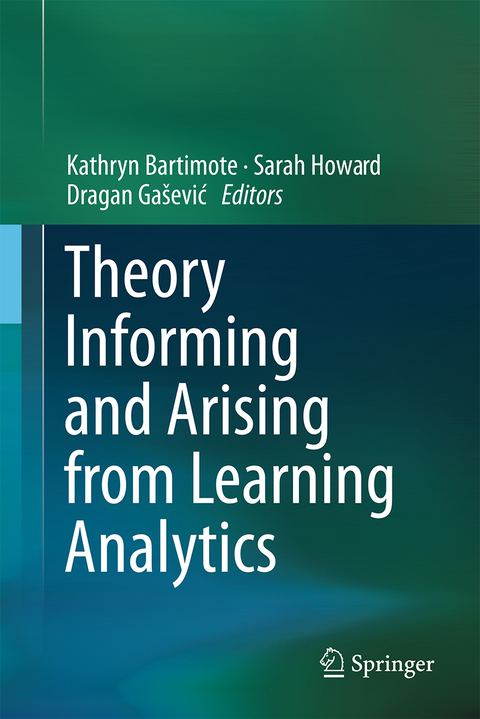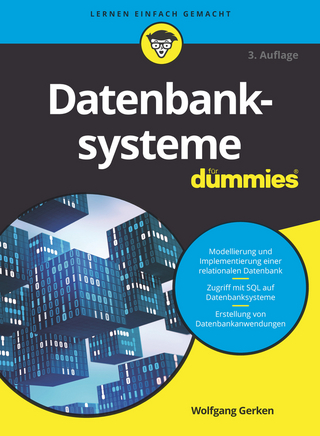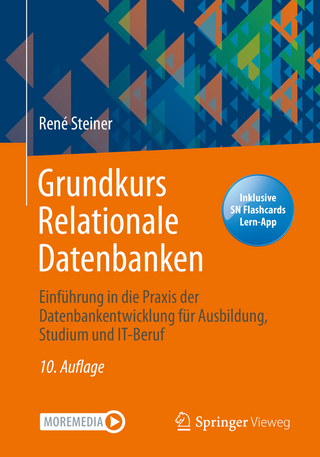
Theory Informing and Arising from Learning Analytics
Springer International Publishing (Verlag)
978-3-031-60570-3 (ISBN)
- Noch nicht erschienen - erscheint am 30.01.2025
- Versandkostenfrei innerhalb Deutschlands
- Auch auf Rechnung
- Verfügbarkeit in der Filiale vor Ort prüfen
- Artikel merken
Theory Informing and Arising from Learning Analytics delves into the dynamic intersection of learning theory and educational data analysis within the field of Learning Analytics (LA). This groundbreaking book illuminates how theoretical insights can revolutionize data interpretation, reshape research methodologies, and expand the horizons of human learning and educational theory. Organized into three distinct sections, it offers a comprehensive introduction to the role of theory in LA, features contributions from leading scholars who apply diverse theoretical frameworks to their research, and explores cutting-edge topics where new theories are emerging. A standout feature is the inclusion of three "in conversation" chapters, where expert panels dive into the topics of ethics, self-regulated learning, and qualitative computation, enriched by accompanying podcasts that provide fresh, thought-provoking perspectives. This book is an invaluable resource for researchers, sparking debates on the evolving role of theory in LA and challenging conventional epistemological views. Published by Springer, it is an essential read for both aspiring and seasoned scholars eager to engage with the forefront of LA research.
Kathryn Bartimote is Senior Lecturer in the School of Education and Social Work at The University of Sydney. Kath is Research Committee Chair for the Centre for Educational Measurement and Assessment (CEMA), and chair/deputy chair for two of the University's human research ethics committees. She is a member of the Executive of the Society for Learning Analytics Research (SoLAR). Kath's research focuses on the topics of motivation and choice, epistemic beliefs, student success, and theory in learning analytics.
Sarah Howard is Associate Professor in the School of Education at the University of Wollongong where is the Head of Research. Sarah is also Group Lead for the Smarter Schools and Digital Technologies group within the SMART Infrastructure Facility at the University. Her research focuses on the use of new technologies and data science to explore classroom practice and teacher change related to technological innovation and integration. Specifically, in her work, Sarah looks at cultural and individual factors of teachers' digital technology use, change process and learning design related to subject areas, school culture and underlying principles of teaching and learning.
Dragan Gasevic is Distinguished Professor of Learning Analytics in the Faculty of Information Technology and Director of the Centre for Learning Analytics at Monash University. He is a founder of the Society for Learning Analytics Research (SoLAR), and served as the President 2015-2017. His research interests in learning analytics centre around the development of computational and design methods that can advance understanding of self-regulated and collaborative learning
Part I State of the Art Theory and Learning Analytics.- Theory and learning analytics a historical perspective.- Making bigger waves Automating theoretical coding to generate educationally.- In Conversation Gulson Anderson & Prinsloo Examining theoretical approaches and future directions for ethics in learning analytics.- Part II Theory Application in Practice Answering Questions and Increasing the Meaningfulness of Learning Analytics Research.- In Conversation Bannert Molenaar & Winne Multiple perspectives on researching and supporting self regulated learning via analytics.- Learning analytics Framework for Analysing Regulation in Collaborative Learning.- Theory and intermediate level knowledge in Multimodal Learning Analytics.- Collaborative learning theory and analytics.- Emotion theory and learning analytics A theoretical framework for capturing emotion regulation using process data.- Integrating theories of learning and social networks in learning analytics.- What could learning analytics learn from Human Computer Interaction theory.- Part III Innovative Theory Uses and Possibilities in Learning Analytics.- In conversation Baker Järvelä & Shaffer The relationship between computational methods and theory in learning analytics.- Theories all the way across The role of theory in learning analytics and the case for unified methods.- Towards a genealogical critical theory of learning analytics.
| Erscheinungsdatum | 31.08.2024 |
|---|---|
| Zusatzinfo | X, 222 p. 26 illus., 16 illus. in color. |
| Verlagsort | Cham |
| Sprache | englisch |
| Maße | 155 x 235 mm |
| Themenwelt | Mathematik / Informatik ► Informatik ► Datenbanken |
| Sozialwissenschaften ► Pädagogik | |
| Schlagworte | Advanced Learning Technologies (ALTs) • Big Data • Collaborative Learning • computational methods • Critical theory • Data-driven learning • Educational Data Mining (EDM) • Educational Quality • Educational Research • Educational Theory • Emotion Regulation (ER) • Ethical Learning Analytics • History of Learning Analytics • Human-Computer Interaction (HCI) Theory • machine learning • Multimodal Data • Predictive Modelling • quantitative ethnography • research ethics • Self-Regulated Learning • Self-Regulated Learning (SRL) • Socially Shared Regulation (SSRL) • social network analysis • sociological perspectives • student privacy • Student success • Theoretical Foundations for Research |
| ISBN-10 | 3-031-60570-5 / 3031605705 |
| ISBN-13 | 978-3-031-60570-3 / 9783031605703 |
| Zustand | Neuware |
| Informationen gemäß Produktsicherheitsverordnung (GPSR) | |
| Haben Sie eine Frage zum Produkt? |
aus dem Bereich


